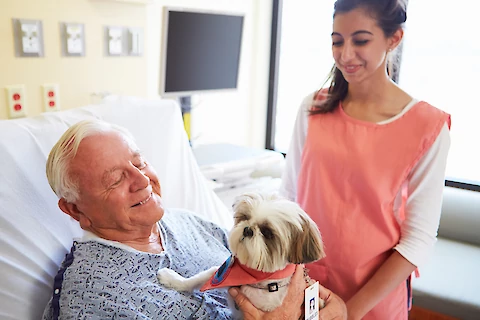
Navigating the transition to hospice care in the Provo area can be a challenging time for seniors and their families. This can be especially difficult when the senior has a beloved pet. For many seniors, their pets are more than just animals—they are companions, friends, and sources of comfort. Yet, when the time comes for a senior to enter into hospice care, what happens to them?
Today, we'll explore the role of pets in seniors' lives and how to find hospice services that accommodate these precious companions.
Understanding the Conflict
Understanding what hospice care is all about is important to ensure the best possible care for your senior loved ones. Hospice care provides comfort, pain management, and emotional support for individuals in the last stages of a terminal illness. However, each facility operates under its unique set of guidelines, which can vary regarding pet rules.
The bond between seniors and their pets is strong, and being separated from them during a crucial time may lead to emotional distress. Therefore, finding a hospice care option that accommodates the pet/owner relationship without compromising other residents and families can be crucial to the well-being of the senior.
Accommodating Pets in Hospice Care
While not all hospice facilities accommodate pets for full-time residency, many have come to recognize the therapeutic benefits of pets and have tailored their policies accordingly. Some facilities allow regular pet visits, while others allow pets to live in their facilities full-time. In many cases, these facilities have staff dedicated to caring for the pets, ensuring they receive proper attention and care while their owners focus on their health.
3 Steps to Finding the Right Hospice Facility
Your senior loved one doesn't have to leave their furry (or feathery or scaly) pet behind when they enter hospice care. Here are three steps to help you, as their family caregiver, find the right care center.
1. Determine Priorities
The first step in finding a pet-friendly hospice care facility is understanding your senior loved one's needs and their pet’s role in their life. If the senior derives substantial comfort from being with their pet all the time, a facility that allows pets to live in may be the only solution.
Once you've decided the facility must allow pets, research potential facilities. Look for pet-friendly hospice care facilities in your area and contact them.
2. Ask Questions
When you get in touch with a facility, ask specific questions about their pet policy.
- What kind of species or breeds are allowed?
- How often are pets allowed to visit?
- Can they stay overnight?
- What are the rules and regulations for having a pet on the premises?
- Are there any additional fees?
Hopefully, you'll find a facility near you where you can bring in your senior loved one's pet for visits. If not, you do have other options, such as in-home hospice care.
3. Prepare the Pet, Paperwork, and Supplies
Ensure the pet is prepared for the transition. The pet should be house-trained and comfortable around people. Make sure vaccinations are up to date (have current vet records on hand), and, if necessary, keep them groomed and free of fleas and ticks. The facility may want to meet the animal in advance or even get references.
When it's time to visit or move into the facility, have everything you need on hand. Don't forget leashes, food, a backup collar with current contact information, clean bedding, and a crate or cage of appropriate size.
We're Here to Help
Helping a loved one transition into hospice care is a difficult process, and having their cherished pet by their side can bring tremendous comfort during this period. By researching and asking the right questions, you can find a hospice care service that respects and accommodates this special bond.
Senior Helpers Provo is here to assist families with pet-friendly hospice needs in Provo, Sandy, American Fork, Draper, or Orem. Our caregivers are skilled in providing personal care, household help, and respite care services that respect the vital emotional bonds our clients have with their pets. Contact us today to learn more about how we can support your family and senior loved one during this challenging transition.